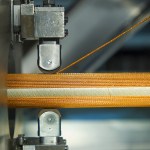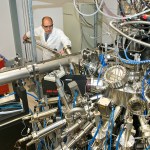superconductivity
Magnets are neverendingly awesome, and superconductors may be the ultimate in cool—they are, after all, literally extremely cold. And not just anyone has the tools to weave superconducting magnets with compressed metallic thread. It's a more essential skill than you might think.
Ultra-cold superconducting magnets steer high-speed particles inside colliders, keeping the beams tight and guiding them smoothly through the curves of circular racetracks. But those magnets generally rely on iron, an intrinsically magnetic metal, for key structures. That works beautifully for the …
High-temperature superconductors (HTS), capable of storing and transmitting electricity with perfect efficiency, are a theoretical stumbling block. The mechanism underlying HTS behavior is a mystery, and the subject of significant contention and investigation among scientists. This puzzle, unlike headline-making unknowns such as dark energy (admittedly awesome and worth losing sleep over), could revolutionize our entire energy infrastructure. But before HTS materials can flood the electricity market, they need to work their magic closer to room temperature (high-temperature is a bit…
In the reader request thread, Brad asks about superconductors:
Why is a room temperature superconductor so hard? Why do things have to be cold for there to be no resistance (I can guess, but my knowledge of super conductors consists of the words "Cooper pairs" which does not get me very far.)
Since next year will mark 100 years since the initial discovery of superconductivity in mercury by Heike Kammerlingh Onnes, this is a good topic to talk about. Unfortunately, it's a bit outside my field, but I can give you what I know from my not-much-better-than-layman's understanding of the field, and…
There's some good stuff in yesterday's post asking what physics you'd like to read more about. I'm nursing a sore neck and shoulder, so I'll only do one or two quick ones today, starting with James D. Miller in the first comment:
1) Is it true that our understanding of quantum physics comes from studying systems with only a small number of particles and there is a good chance our theories won't hold in more complex systems.
It all depends on how you define your terms-- what counts as a "small number" of particles, and what counts as not holding?
It's certainly true that most of the…
Despite their name, "high-temperature" superconductors require pretty darn cold conditions -- all far below freezing temperatures, some near absolute zero (-273 degrees Celsius) -- to operate without energy loss. As a result, they're not practical for everyday uses like more efficient power transmission -- that is, unless you have a stockpile of liquid helium or nitrogen dewars just hanging around your house.
So why can't we create room-temperature superconductors? That's a question that scientists are still trying to answer.
In research released today in the journal Nature, a team of U.S.…

